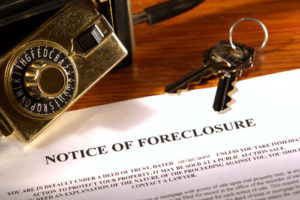When is it too Late to File Bankruptcy to Stop Foreclosure in North Carolina

If a homeowner falls behind on their mortgage payments, they might feel all hope is lost. Fortunately, this is not always the case. In certain situations, homeowners have the option of filing for bankruptcy to stop a foreclosure.
However, there comes a point in the foreclosure process when it becomes too late for a property owner to stop a foreclosure with a bankruptcy filing.
Timeline of the Foreclosure Process
The foreclosure process timeline begins once a homeowner misses mortgage payments. When that payment becomes about a few months past due, the mortgage servicer will usually contact the homeowner to discuss options for getting the homeowner current on their mortgage, such as applying for a loan modification or a forbearance period that pauses the need to make payments.
If the homeowner is unable or unwilling to address the mortgage in a manner satisfactory to the mortgage servicer then it will issue a notice of default and acceleration of the mortgage debt.
If authorized by the mortgage agreement, a bank may choose a nonjudicial foreclosure in North Carolina. A nonjudicial foreclosure does require a hearing before the clerk of court where the court can confirm the validity of the debt, that the homeowner has defaulted under the terms of the mortgage, and that the foreclosing party legally owns the debt and mortgage. If the court approves, the lender can proceed with the foreclosure sale after advertising the sale for 3 weeks.
Alternatively, a judicial foreclosure involves a civil lawsuit-like process. But whether the lender proceeds with a nonjudicial foreclosure or judicial foreclosure, the foreclosure process ends with a sale of the property via public auction. The lender can place a credit “bid” up to the amount owed.
Can a Foreclosure be Stopped with a Bankruptcy Filing?
Yes a foreclosure can be stopped with a bankruptcy filing throughout most of the process. If the goal is for the property owner to retain the property then a reorganization bankruptcy filing under chapter 13 or chapter 12 or chapter 11 is appropriate. A chapter 7 will be of very limited benefit if the goal is long term retention of the property. In additional to stopping a foreclosure, a bankruptcy filing will stop other collection activities. Most individual homeowners choose chapter 13 bankruptcy as that is the cheapest and simplest form of individual reorganization. A chapter 13 allows a debt to cure the pre-bankruptcy arrears through a plan which can be as long as 5 years. The filing of a bankruptcy creates an automatic stay on collection activities although prior bankruptcy cases pending in the prior 12 months can create a deviation from the general rule.
When Is It Too Late To Stop a Foreclosure with a Bankruptcy Filing?
Under North Carolina law, a homeowner’s last chance to stop a foreclosure with a bankruptcy filing comes upon the expiration of the upset bid period. This either means the sale date plus 10 days or another 10 days after the final upset bid is submitted at the country courthouse. The bankruptcy case must be filed no later than 4:59 pm on the 10th day. The 10th day cannot fall on a weekend or a legal holiday where the courthouse is closed. However, weekends and legal holidays where the courthouse is closed count towards the 10 days even though the final day cannot fall on such a day.
Contact a Bankruptcy Attorney Today
If you are facing foreclosure of your property, don’t wait to get the legal assistance you need. An experienced bankruptcy attorney could help protect your rights and property. Contact the Sasser Law Firm today for a consultation to go over your legal options with a bankruptcy attorney in Cary, NC. For chapter 13 cases, Sasser Law Firm does not require any upfront fees or cost to be paid as we collect those through the repayment plan.
- About the Author
- Latest Posts
For more than 20 years, the Sasser Law Firm has been helping individuals and business owners sort through financial hardships to see the light at the end of the tunnel. Our North Carolina bankruptcy attorneys are all board-certified specialists, which means we have passed a complex exam, undergone a thorough peer review, and continue to earn legal education credits in this ever-evolving area of law.














